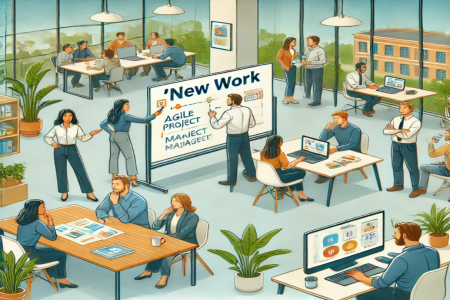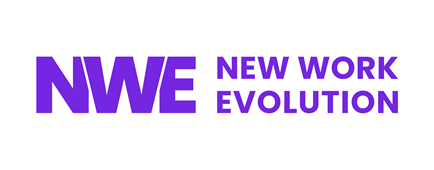The most important advantages of New Work: flexibility, innovation and satisfaction in everyday working life
The world of work is changing, and one term stands out in particular: New Work. But what exactly is behind this concept and what benefits does it offer companies and employees? On this page, you can find out everything you need to know about the benefits of New Work - and why they are the key to long-term success.
What is New Work and why are these benefits so important?
New Work refers to a progressive way of working that is characterized by versatility, technological changes and a strong focus on people. It is not just about the use of new technologies, but above all about a profound change in corporate culture that offers employees more autonomy and appreciation. At a time when megatrends such as automation, a shortage of skilled workers and the desire for a better work-life balance are shaping the world of work, the benefits of New Work are particularly important. They enable companies to successfully adapt to these changes and secure long-term competitive advantages by increasing employee satisfaction and enthusiasm as well as promoting a more sustainable way of working.
The most important New Work benefits at a glance

Adaptability is one of the key benefits of New Work. Whether working from home, flexitime or remote work - innovative working models enable employees to work more productively and with less stress. At the same time, companies benefit from a more efficient use of resources and lower fixed costs.
New Work focuses on the meaning of work. Employees who find their tasks meaningful are more motivated and committed. This not only leads to higher productivity, but also strengthens the emotional bond with the company.
Modern working methods such as Design Thinking, Scrum or Kanban stimulate creativity. Teams can react more quickly to challenges and develop creative solutions. Companies that position themselves as New Work remain competitive as a result.
An often underestimated advantage of New Work is the strengthening of the employer brand. Companies that value contemporary working models attract top talent. Generation Z and millennials in particular prefer employers that offer scope and a positive corporate culture.
With less office space, reduced commuting and digital processes, New Work contributes to environmental sustainability. At the same time, organizations save considerable costs as a result of these changes.
Take advantage of the New Work benefits now!
Would you like to benefit from the advantages of New Work? Find out how you can make your company future-proof.
Home office tips for more productivity
Increase your efficiency in your home office with practical tips and proven methods.
Agile methods: The best approaches for your team
Optimized workflows for your team through agile methods.
How digitalization succeeds in companies
Find out how digitalization can help your company succeed.
Strategies for implementing New Work
1. Introduction of flexible working models
- Flexibility is one of the central features of New Work. Companies should offer various models that meet the individual needs of their employees. This can be done not only through working from home, but also through modern working time models such as flexitime or a 4-day week. Another aspect could be job sharing, where two employees share a full-time position. These models allow employees to achieve a better work-life balance, which leads to greater satisfaction and productivity. In addition, digital tools such as virtual meeting platforms or cloud-based document management systems can improve access to information and collaboration across geographical distances.
2. Dynamic working methods
- Uncomplicated methods such as sprint methodologies, Kanban or Lean strengthen collaboration, transparency and the ability to adapt quickly to changing requirements. Companies that determine working methods are better able to react quickly to market changes or customer requirements. Tools such as Trello, Asana or Slack help these methods by providing a central platform for communication, task management and project monitoring. An important aspect of this is that agile working methods empower staff by giving them more duties and autonomy in their working relationship. They are not just “performers”, but active co-creators of projects and processes.
3. Promotion of further training
- Continuous training and personal development are crucial to keep pace with the constant changes in the world of work. Companies should offer programs to develop their employees, be it through online courses, workshops or coaching opportunities. Promoting skill-building initiatives such as digital skills, leadership skills and soft skills not only boosts employees' professional qualifications, but also promotes self-confidence and career satisfaction. In addition, companies could provide learning budgets with which employees can invest in their further training according to their own interests and needs. Mentoring by experienced colleagues is also a valuable form of support.
4. Cultural change
- Cultural change in a company is the key to the successful implementation of New Work. Appreciation, trust and personal responsibility must not only be practiced in theory, but also in practice. This can be achieved through regular feedback meetings, employee surveys and transparent communication. It is important that managers act as role models. They should emphasize the value of personal initiative and responsibility and give employees the freedom to make decisions independently. An error-friendly culture, in which mistakes are also seen as learning opportunities, promotes creativity and employee commitment. The workplace design should also expand on the principles of New Work. Open, creative workspaces, retreats for concentrated work and the promotion of teamwork through collaboration areas are helpful measures that visually and structurally support cultural change.
5. Promotion of diversity and inclusion
- New Work should not only encourage variability and trendy working methods, but also diversity and inclusion within the company. A working environment that values diverse perspectives and experiences leads to more creative solutions and strengthens employee loyalty. Companies can introduce diversity initiatives and programs to promote equality and equal opportunities in order to create a respectful and inclusive work environment.
6. Promoting sustainability and a sense of purpose
- Employees are increasingly looking for a workplace that not only maximizes financial gain, but also takes on social responsibility. Therefore, an important part of New Work should be the integration of sustainability into the corporate culture. This can be done through environmental protection, social responsibility initiatives and clear communication of the company's ideals and vision. If employees feel that their work has a positive impact on society, they will be more willing to work hard and identify with the company.


